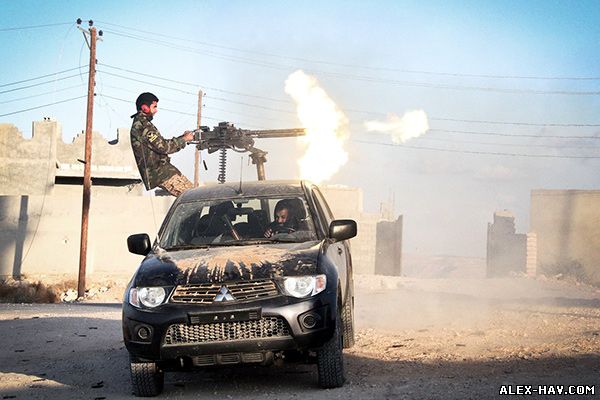07:15 The consequences of the "Arab Spring" | |

The Middle East and North Africa is experiencing the effects of an "Arab awakening". Basic - destruction of the state of Libya, unresolved Syrian conflict and war is gaining momentum in Yemen. Indirect consequence of "awakening" is the emergence of "Islamic state" (IG), which once again called into question the integrity of Iraq and has made important changes in the course of the Syrian conflict. What awaits the region in 2015 - read the new chapter of the forecast "international threats - 2015" prepared for "Heathcliff" agency "Foreign Policy."
At the beginning of 2015 there is no reason to believe that the military-political crisis and a crisis of power in Libya will soon be overcome. Formally, the country has two centers of power in the face of Islamist General National Congress (INC) in Tripoli and antiislamistskogo front, consisting of internationally recognized government Abdullah Al-Thani in Tobruk and the National Army Gen. Khalifa Haftorah. Both "power center" control roughly equal parts of the state. In doing so, they are not internally monolithic. Activities launched in September 2014 the UN mission in Libya, seems to continue, but hardly contribute to resolving the crisis, because negotiations have not been invited to the Islamists. Under these conditions the situation in the country in 2015 is hardly stabilized. In Egypt, there is a tendency to overcome the social and political tensions. The spring 2015 parliamentary elections are scheduled and a decision on a lawsuit to overthrow the Islamist president Mohamed Morsi. The main tasks that President al-Sisi must decide to defuse the situation in the country, - elimination of the economy from the crisis and the problem with the Islamists ("Muslim Brotherhood" and extremists in the Sinai). In 2015, we should expect from Cairo course to engage in the political process of the Egyptian "liberals" cautious policy with regard to "Muslim Brotherhood" and enhancing relations with Western donor countries. Stabilization of Sinai, despite the military measures in the current year is not expected. The Syrian crisis has entered a new phase. Military-political confrontation develops on three fronts: among the various factions of the opposition, between Damascus and the opposition and between Damascus and the IG. It can be expected that some of the armed Syrian opposition fighters to join the ranks of the "Islamic state." International efforts to promote dialogue between representatives of the regime and the opposition will again result. The main axis vnutrisiriyskogo conflict in 2015 will be the fight forces of Bashar al-Assad and his foreign allies against the IG. The position of the "Islamic State" in 2015 remain strong. Militants control about a third of the territory of Iraq and Syria, building an effective management system and with the support of local tribal sheikhs. International intervention is not conducive to solving the problem. The efforts of the Assad regime and its regional allies enough to defeat the extremists, but Baghdad still can not oppose the caliphate strong national army. From US plans to build training camps training of military personnel to combat the IG in 2015, you should not expect too much. Prevents success confrontation militants and Ankara's position, which continues to use its internal political purposes Mideast agenda: the IG, "Muslim Brotherhood", the Palestinian-Israeli conflict, the Kurdish question. President-elect Recep Tayyip Erdogan will keep the foreign policy of the time of his premiership. Its main ingredients - focus on leadership in the Arab region, building on the network "Muslim Brotherhood" anti-Israeli rhetoric, building flexible alliances with regional powers to promote the interests of Turkish business, as well as conducting "talks for talks' on EU accession and implementation of integration projects in the Turkic countries, the former Soviet Union. We should expect tighter attacks against the West and the intensification of contacts, especially economic, and Russia. 2015 will be difficult for Saudi Arabia with the crisis in Yemen and the deterioration of the situation in Bahrain - both factors associated with the activity of the Shiites, the main security threat to Riyadh. Fears of the Saudi leadership is and outline the normalization of relations between the West and Iran. And although the conclusion of a final agreement on the Iranian nuclear program in question, and pushed his term at the end of June 2015, the continuation of this process may eventually exacerbate conflicts within the royal family. Possible new Saudi initiative to deepen integration within the Gulf Cooperation Council, especially in the military sphere. Confrontation IG remains the number one problem in the regional agenda. Against this background, the crisis in Libya and Saudi border areas will be exacerbated, and the victims political defeat in a number of countries in the Middle East "Muslim Brotherhood" will remain an important factor in local political processes. | |
|
| |
| Total comments: 0 | |